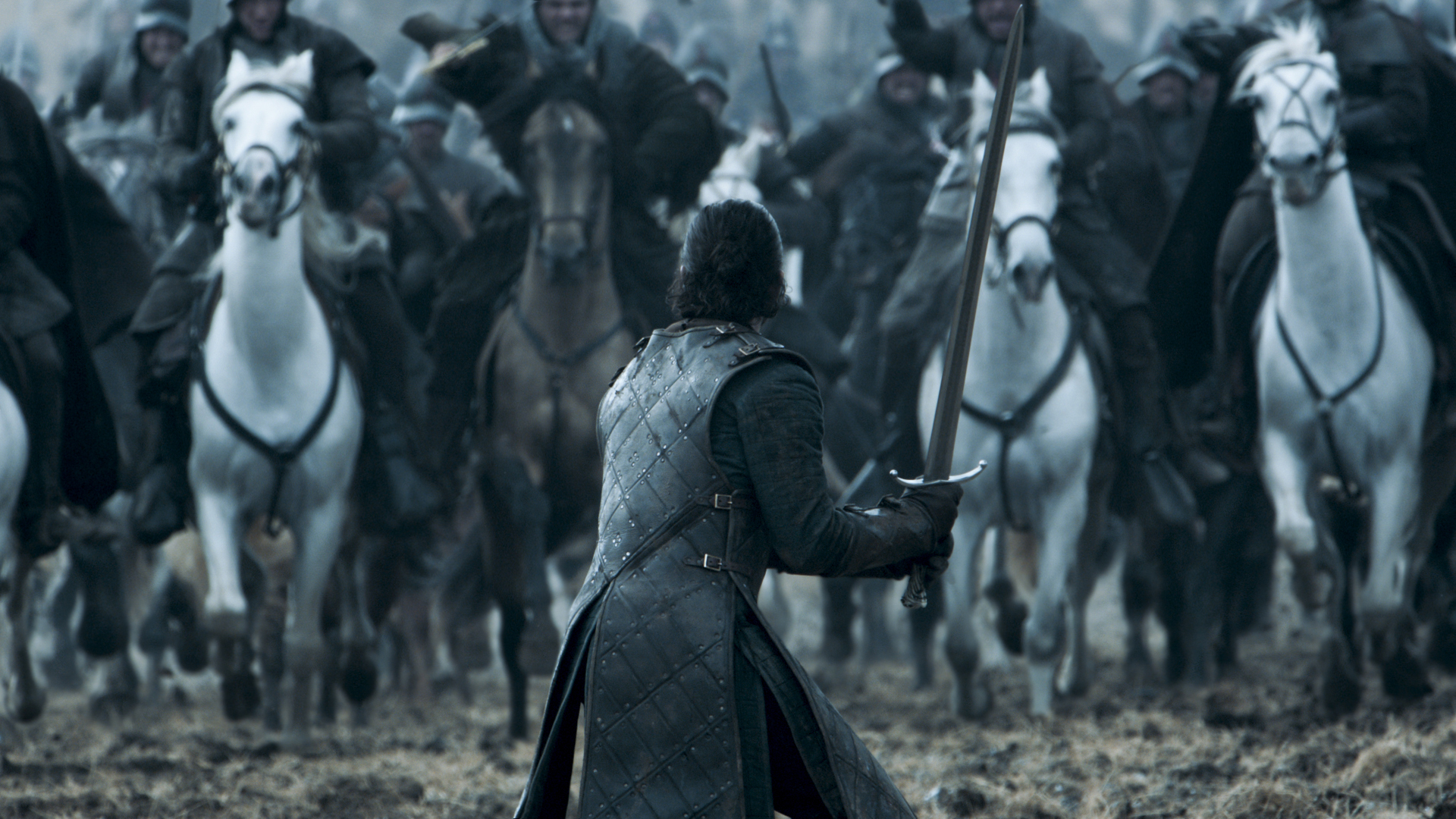
Correction appended: June 20, 2016
In a season during which Game of Thrones has been showing its advanced age, “Battle of the Bastards” proved there’s life in the program yet.
Season six has, for this viewer, been a bit of a drag, spending its early going noodling around repetitive plotlines (Daenerys getting into a scrape, again, and then breaking free, again; Arya undergoing yet more of her endless training montage before deciding to scotch the whole thing). But “Battle of the Bastards,” occupying the ninth-episode spot in the season when action traditionally reaches its high point, immediately took its place among some of the show’s very best episodes.
Dealing first with the Dany plotline—there’s still, six seasons in, a primal thrill to watching her ride her dragons and incinerate her enemies, and her new alliance with Yara raised new and provocative ideas about female leadership—a state of affairs that has precious few precedents on this show. Her getting Yara to promise to change the behavior of her people, and specifically to end the Ironborn’s tradition of rape, continued a motif of challenging patriarchy that was perhaps the only worthwhile takeaway from her captivity and escape. Maybe the reason Daenerys has historically had far more trouble leading than she does conquering is because she’s been forced by circumstance to deal only with male counterparts, and all their flaws. It’s this level of real insight that adds a bit of necessary bite to the image of the would-be queen soaring and burning.
As for the show’s centerpiece, the action at the “Battle of the Bastards” between Jon and Ramsay, it’s among the most beautifully shot work in the show’s history. The sequence of Jon facing down a marauding horde all by himself was striking; what followed, a chaotic mess at which the onetime Lord Commander of the Night’s Watch stood untouched, seemingly invincible like some fur-clad cousin of Neo in The Matrix, was remarkable.
The battle had at this point already masterfully used the tools of suspense to manipulate us. Rickon Stark, the brother for whose safety Jon was fighting, was commanded by evil Ramsay to run and evade Ramsay’s arrows; having dodged three that the camera closely followed, he seemed safe until a surprise fourth came out of the blue. Jon was therefore fighting a nihilist’s fight. We knew from a crucial (and well-acted on both sides) conversation with Melisandre that he didn’t want to come back if killed, but it seemed almost not to matter whether he died.
That among the show’s most elaborate battle sequences ever—with flying horses and a tragically wounded giant—ended in hand-to-hand combat is one of the episode’s crucial ironies. For all the many, many men were implicated in this battle, it came down to two titanic forces of personality, one of whom, Ramsay, was both unwilling and unable to fight fair. Having shot several arrows at an unarmed Jon, he had no defense against his blows. Without the ability to call the tune, Ramsay, for so long (too long) in this show’s run an almost omnipotent supervillain, was impotent, useless.
But it wasn’t Jon who had the last word. It was Sansa, whose planning of the battle proved that she’d become not just a realist but a master strategist. Sansa, who just last season was subject to a brutal (and, rightly, controversial) rape scene, was the one to enact bloody revenge, turning Ramsay’s weapons of war, his voracious hounds, back on him. (There was no reason to believe this would work, given the dogs’ loyalty to their master, but for Ramsay’s overzealous bragging that he’d been starving the animals for a week to ensure their hunger.)
This was remarkable given that Sansa has not historically been self-assured like Daenerys—it’s almost hard to remember that she began the series a fantasist, obsessed with love and marriage. As she left, Sansa didn’t look triumphant; murder is something only the cruel would celebrate. But granting the crucial moment of victory and reclamation of Winterfell to a female character, one who’s been subject to so much mistreatment before she came into a surprising destiny, was a victory for the show, at least. It took a story that had been repetitive—both repeating itself and resonating, uninterestingly, with age-old tropes—and spun it forward, granting a moment of power to a new sort of heroine.
Correction: The original version of this story incorrectly described the character Jon Snow. He is the former Lord Commander of the Night’s Watch.
More Must-Reads From TIME
- The 100 Most Influential People of 2024
- The Revolution of Yulia Navalnaya
- 6 Compliments That Land Every Time
- What's the Deal With the Bitcoin Halving?
- If You're Dating Right Now , You're Brave: Column
- The AI That Could Heal a Divided Internet
- Fallout Is a Brilliant Model for the Future of Video Game Adaptations
- Want Weekly Recs on What to Watch, Read, and More? Sign Up for Worth Your Time
Contact us at letters@time.com